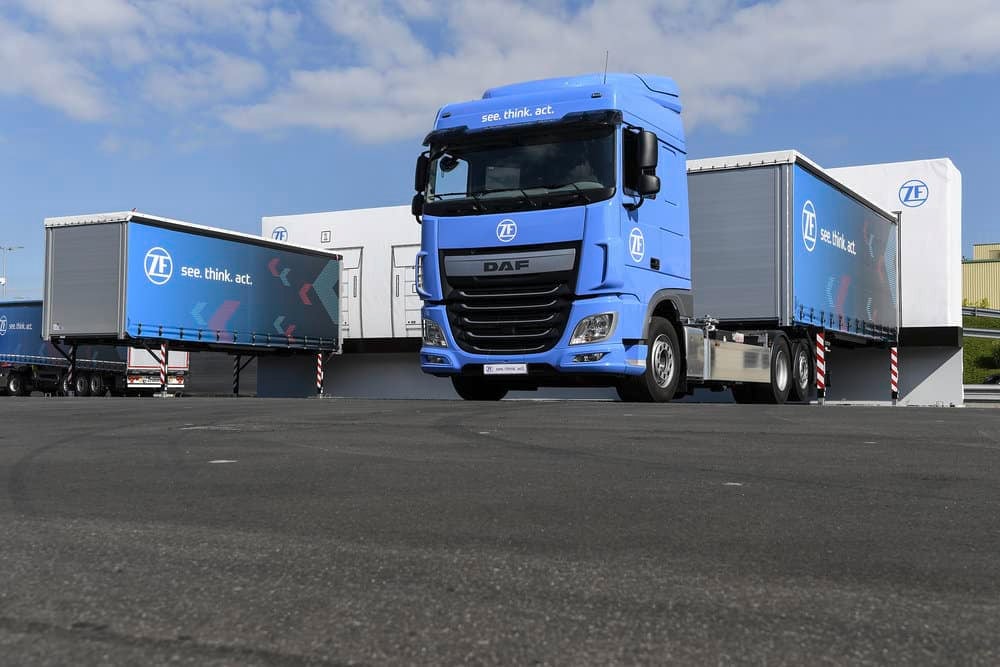
At the IAA Commercial Vehicles 2018, ZF, the German automobile supplier showcased its intelligent logistics technology that would make loading and unloading processes at depots more efficient and safer. One of the visible themes around the IAA event this year has been about intelligent mobility, and ZF’s Innovation Truck and routing systems were no exception to the rhetoric.
The logistics industry is under constant pressure to innovate and improve efficiency, leading to manual labor being phased out and be replaced with autonomous and intelligent systems – especially in the depot front and paying rich dividends to the adopters. In that stead, ZF Innovation Truck and the Terminal Yard Tractor are two equipments that could help further the boundaries of intelligent warehousing logistics.
“Vehicles that, thanks to our technologies, can see, think and act are turning the idea of consistent smart logistics into reality, at depots and other specified areas,” said Fredrik Staedtler, head of ZF’s Commercial Vehicle Technology Division. “These vehicles can prevent maneuvering damage and downtimes, which gives logistics companies a competitive advantage. The functions presented in our current innovation vehicles are therefore applications that are in high demand and pay off quickly.”
The Innovation Truck is a hybrid truck that removes the need for drivers to load or unload freight, as it is intelligent enough to carry out these tasks autonomously without a driver. Once permission is granted, the truck eases into the specific target position autonomously and can load and unload containers on its own. The movements are controlled by ZF ProAI, a system that assists in precisely carrying out said tasks, quickly and safely. This technology not only reduces driver fatigue and the need for skilled labor, but also increases the efficiency of warehouse logistics, as machines work without any stress or distraction.
The ZF ProAI computer unit is the technology underlying the Terminal Yard Tractor as well, coordinating the functions of longitudinal and lateral guidance, enabling the shuttle vehicle to help with steering the trailer from the truck to the ramp for the loading and unloading process. Once done, the trailer would be traced back to the truck.
Extending out from the warehousing floor to last-mile delivery, ZF delivery vans have the ability to autonomously drive into parking spaces, making the lives of delivery people easier. Since last-mile delivery would usually mean driving across urban city limits, ZF delivery vans are electric, leading to zero-emission transits.
“Our Innovation Van is an extensive solution tailored to the requirements of the delivery sector,” said Gerhard Gumpoltsberger, head of Innovation Management at ZF. “In order to meet the wide range of challenges of inner-city deliveries, we called upon our entire range of competencies – from autonomous driving and electromobility right up to networking within a smart support system.”
The delivery vans come with level 4 automation, leading to near perfect self-driving possibilities, as the vehicle can detect obstacles and traffic signals, stay on course, and react intelligently to extraordinary situations on the road. The vans also come with a tablet-based remote control, expected to help couriers exert greater control over the vehicle. “If two addresses are so close that the best delivery route is on foot, the Innovation Van follows the courier as if on a virtual leash. If there is no parking available outside an address, the courier can send the vehicle ahead to the next stop, where it will look for a parking space on its own,” said ZF in a statement.
The algorithms aboard the van also help with identifying the most optimized delivery routes, based on various parameters like traffic conditions, energy consumption, and ideal delivery times. ZF also offers the data to be displayed through mixed reality smartglasses which can help drivers review relevant data without taking eyes off the road. And to surmise ZF’s last-mile capabilities in the words of its project manager Georg Mihatsch, “the parcel itself finds the best way to get to the customer – and the vehicle follows.”










